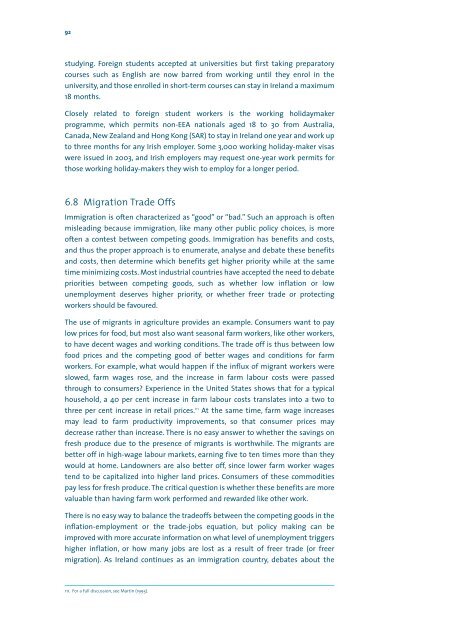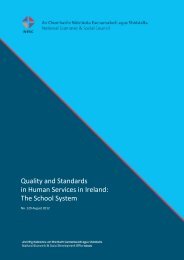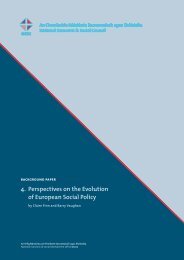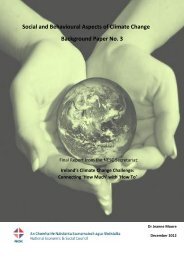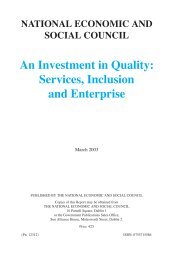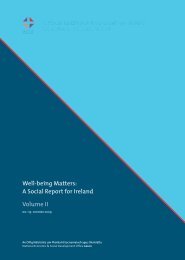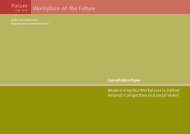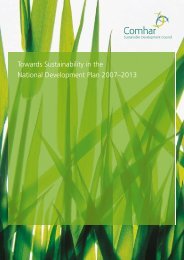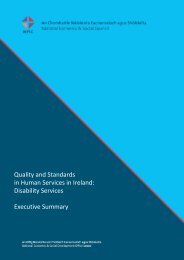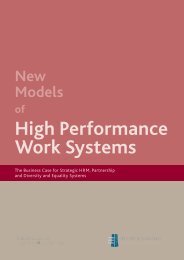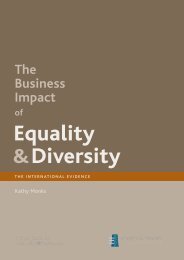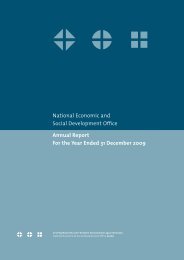Managing Migration in Ireland - European Commission - Europa
Managing Migration in Ireland - European Commission - Europa
Managing Migration in Ireland - European Commission - Europa
You also want an ePaper? Increase the reach of your titles
YUMPU automatically turns print PDFs into web optimized ePapers that Google loves.
92study<strong>in</strong>g. Foreign students accepted at universities but first tak<strong>in</strong>g preparatorycourses such as English are now barred from work<strong>in</strong>g until they enrol <strong>in</strong> theuniversity, and those enrolled <strong>in</strong> short-term courses can stay <strong>in</strong> <strong>Ireland</strong> a maximum18 months.Closely related to foreign student workers is the work<strong>in</strong>g holidaymakerprogramme, which permits non-EEA nationals aged 18 to 30 from Australia,Canada, New Zealand and Hong Kong (SAR) to stay <strong>in</strong> <strong>Ireland</strong> one year and work upto three months for any Irish employer. Some 3,000 work<strong>in</strong>g holiday-maker visaswere issued <strong>in</strong> 2003, and Irish employers may request one-year work permits forthose work<strong>in</strong>g holiday-makers they wish to employ for a longer period.6.8 <strong>Migration</strong> Trade OffsImmigration is often characterized as “good” or “bad.” Such an approach is oftenmislead<strong>in</strong>g because immigration, like many other public policy choices, is moreoften a contest between compet<strong>in</strong>g goods. Immigration has benefits and costs,and thus the proper approach is to enumerate, analyse and debate these benefitsand costs, then determ<strong>in</strong>e which benefits get higher priority while at the sametime m<strong>in</strong>imiz<strong>in</strong>g costs. Most <strong>in</strong>dustrial countries have accepted the need to debatepriorities between compet<strong>in</strong>g goods, such as whether low <strong>in</strong>flation or lowunemployment deserves higher priority, or whether freer trade or protect<strong>in</strong>gworkers should be favoured.The use of migrants <strong>in</strong> agriculture provides an example. Consumers want to paylow prices for food, but most also want seasonal farm workers, like other workers,to have decent wages and work<strong>in</strong>g conditions. The trade off is thus between lowfood prices and the compet<strong>in</strong>g good of better wages and conditions for farmworkers. For example, what would happen if the <strong>in</strong>flux of migrant workers wereslowed, farm wages rose, and the <strong>in</strong>crease <strong>in</strong> farm labour costs were passedthrough to consumers? Experience <strong>in</strong> the United States shows that for a typicalhousehold, a 40 per cent <strong>in</strong>crease <strong>in</strong> farm labour costs translates <strong>in</strong>to a two tothree per cent <strong>in</strong>crease <strong>in</strong> retail prices. 111 At the same time, farm wage <strong>in</strong>creasesmay lead to farm productivity improvements, so that consumer prices maydecrease rather than <strong>in</strong>crease. There is no easy answer to whether the sav<strong>in</strong>gs onfresh produce due to the presence of migrants is worthwhile. The migrants arebetter off <strong>in</strong> high-wage labour markets, earn<strong>in</strong>g five to ten times more than theywould at home. Landowners are also better off, s<strong>in</strong>ce lower farm worker wagestend to be capitalized <strong>in</strong>to higher land prices. Consumers of these commoditiespay less for fresh produce. The critical question is whether these benefits are morevaluable than hav<strong>in</strong>g farm work performed and rewarded like other work.There is no easy way to balance the tradeoffs between the compet<strong>in</strong>g goods <strong>in</strong> the<strong>in</strong>flation-employment or the trade-jobs equation, but policy mak<strong>in</strong>g can beimproved with more accurate <strong>in</strong>formation on what level of unemployment triggershigher <strong>in</strong>flation, or how many jobs are lost as a result of freer trade (or freermigration). As <strong>Ireland</strong> cont<strong>in</strong>ues as an immigration country, debates about the111. For a full discussion, see Mart<strong>in</strong> (1993).


